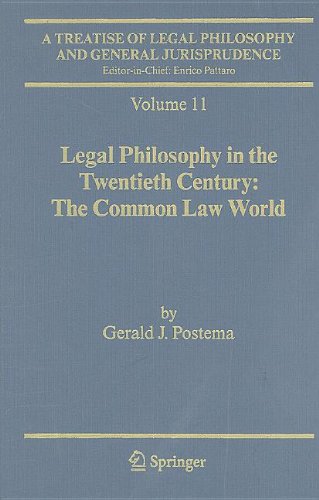

Most ebook files are in PDF format, so you can easily read them using various software such as Foxit Reader or directly on the Google Chrome browser.
Some ebook files are released by publishers in other formats such as .awz, .mobi, .epub, .fb2, etc. You may need to install specific software to read these formats on mobile/PC, such as Calibre.
Please read the tutorial at this link: https://ebookbell.com/faq
We offer FREE conversion to the popular formats you request; however, this may take some time. Therefore, right after payment, please email us, and we will try to provide the service as quickly as possible.
For some exceptional file formats or broken links (if any), please refrain from opening any disputes. Instead, email us first, and we will try to assist within a maximum of 6 hours.
EbookBell Team

5.0
108 reviewsA Treatise of Legal Philosophy and General Jurisprudence is the first-ever multivolume treatment of the issues in legal philosophy and general jurisprudence, from both a theoretical and a historical perspective. The work is aimed at jurists as well as legal and practical philosophers. Edited by the renowned theorist Enrico Pattaro and his team, this book is a classical reference work that would be of great interest to legal and practical philosophers as well as to jurists and legal scholar at all levels. The work is divided The theoretical part (published in 2005), consisting of five volumes, covers the main topics of the contemporary debate; the historical part, consisting of six volumes (Volumes 6-8 published in 2007; Volumes 9 and 10, published in 2009; Volume 11 published in 2011 and volume 12 forthcoming in 2012/2013), accounts for the development of legal thought from ancient Greek times through the twentieth century. The entire set will be completed with an index.
Volume 11
Legal Philosophy in the Twentieth Century: The Common Law World
Legal Philosophy in the Twentieth Century: The Common Law World offers a fresh, philosophically engaged, critical interpretation of the main currents of jurisprudential thought in the English-speaking world of the 20th century. It tells the tale of two lectures and their legacies: Oliver Wendell Holmes, Jr.’s “The Path of Law” (1897) and H.L.A. Hart’s Holmes Lecture, “Positivism and the Separation of Law and Morals” (1958). Holmes’s radical challenge to late 19th century legal science gave birth to a rich variety of competing approaches to understanding law and legal reasoning from realism to economic jurisprudence to legal pragmatism, from recovery of key elements of common law jurisprudence and rule of law doctrine in the work of Llewellyn, Fuller and Hayek to root-and-branch attacks on the ideology of law by the Critical Legal Studies and Feminist movements. Hart, simultaneously building upon and transforming the undations of Austinian analytic jurisprudence laid in the early 20th century, introduced rigorous philosophical method to English-speaking jurisprudence and offered a reinterpretation of legal positivism which set the agenda for analytic legal philosophy to the end of the century and beyond. A wide-ranging debate over the role of moral principles in legal reasoning, sparked by Dworkin’s fundamental challenge to Hart’s theory, generated competing interpretations of and fundamental challenges to core doctrines of Hart’s positivism, including the nature and role of conventions at the foundations of law and the methodology of philosophical jurisprudence.